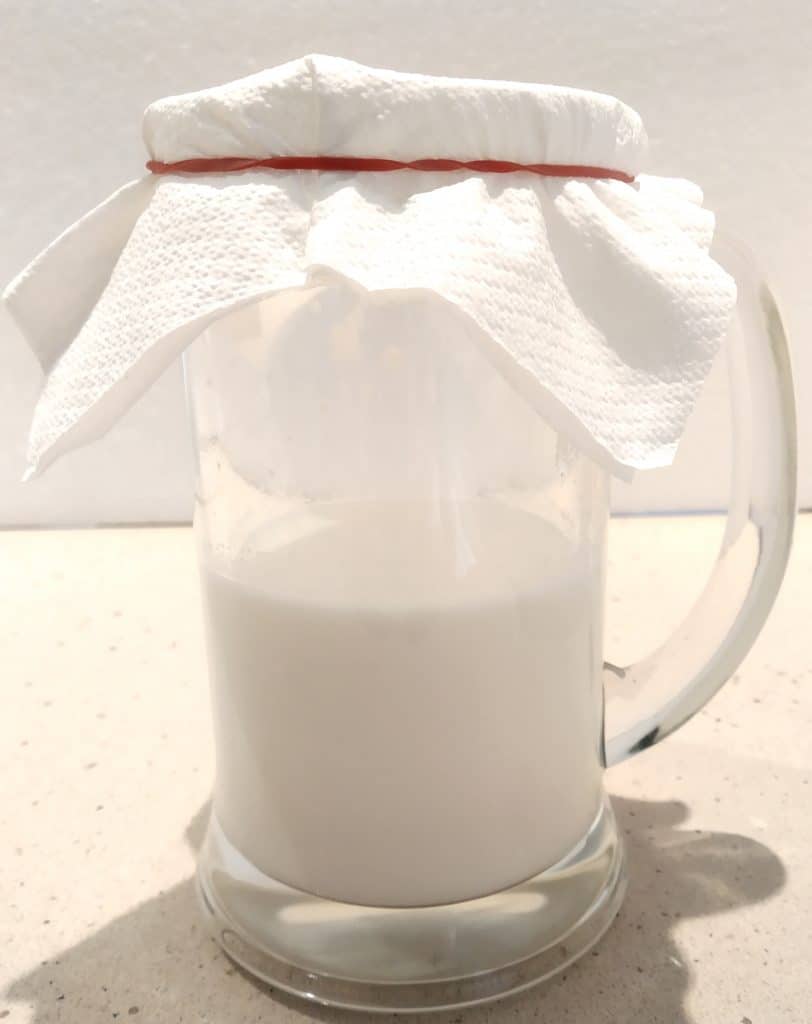![What Is Kefir? [Benefits and Side Effects]](https://myfermentedfoods.com/wp-content/uploads/2018/04/Depositphotos_349602532_ds-1-1024x684.jpg)
What is Kefir
Kefir is a fermented drink made of cow, sheep or goat milk and kefir grains. Kefir grains are white particles consisting of bacteria and yeast mixture clumped together with milk proteins and lactose (natural milk sugar).
The ‘grains’ look like beads/small clumps of cauliflower and range from a size of a grain of wheat to the size of a hazelnut.
Like many fermented foods, making kefir started a few centuries ago. It all began with the shepherds living on the slopes of the North Caucasus Mountains in what is today Russia.
The people from this region are known for their longevity and good health, attributed partly to their routine consumption of kefir.
In Soviet Union kefir was used in hospitals for treating people with cancer, different allergies and gastrointestinal disorders.
Kefir taste
Kefir tastes mildly sour with a slight ‘fizz’. The taste differs depending on the milk used and the temperature at which milk ferments.
It is one of the most nutritious drinks you can have and it is very rich in probiotics. Kefir should be consumed within 2-3 days and kept up to a week if refrigerated. As it is natural and organic beverage it cannot last any longer as it does not contain any preservatives and additives.
This fermented drink is highly consumed beverage in Turkey and used as an ingredient in some of their local recipes (e.g. kefir dip).
The word kefir in Turkish means ‘feeling good’. Apart from being rich in probiotics it also contains substances like calcium, magnesium, phosphorus, zinc and vitamins.

Benefits of Kefir
Powerhouse of nutrition
What makes kefir a perfect health drink is its rich content of nutrients. Do you know most diseases occur due to the lack of vitamins, minerals, antioxidants, and other nutrients in your diet? These nutrients are needed by your body to perform normal physiological functions. The lack of these vitamins and minerals can hamper bodily functions thus triggering the development of diseases.
You may be able to increase the good nutrients in your body by drinking nutrient-rich kefir. It is estimated that a 6-ounce or 175-ml serving of kefir contains the following nutrients:
- Protein: 4 grams
- Vitamin B12: 12% of the RDI
- Calcium: 10% of the RDI
- Magnesium: 3% of the RDI
- Phosphorus: 15% of the RDI
- Vitamin D: Trace
A single serving of kefir contains just 100 calories, 7 grams of carbohydrates, and 3 grams of fats depending on the milk used. This means it can be a perfect replacement for your morning cup of tea or coffee, especially if you are conscious of your intake of calories, carbs, and fats.
Enhances digestive health
The probiotic properties of kefir are more powerful than that of yogurt. This means it contains more beneficial microorganisms that can enhance the gut flora and support the process of digestion.
The probiotic action of kefir can also help in weight management and support mental health.
Antibacterial properties
Probiotics in kefir could protect you against infections by acting as a natural antibiotic agent. They can inhibit the growth of harmful bacteria such as Helicobacter pylori, Salmonella, and E. coli in your digestive system and reduce the risk of intestinal infections.
Improves bone health
Osteoporosis, a disorder characterized by the deterioration of the bone tissues, is a major precursor to fractures, especially in the postmenopausal women.
Drinking kefir regularly may benefit women. Kefir made from full-fat milk cam provide a rich source of calcium and vitamin K2, both of which play a role in improving bone health and preventing osteoporosis and fractures.
May reduce risk of cancer
The risk of cancer, one of the leading causes of death across the world, could be reduced to some extent by drinking kefir regularly.
The probiotics in this fermented drink are believed to control the growth of the tumor cells by stimulating the defense functions of your immune system. It may be effective in fighting cancers of the stomach, breast, rectum, and colon.
Eases constipation
If you suffer from chronic constipation and other digestive disturbances, drinking kefir two to three times a day could help ease the symptoms.
The probiotics in kefir can restore the balance of healthy bacteria in your intestine and thus, support the digestive functions. This could enhance bowel movements, and provide relief from constipation, loose motions, and indigestion.
Low in lactose
Dairy products like milk and yogurt contain lactose, which is a natural sugar. In patients suffering from lactose intolerance, the body is unable to break down or digest lactose properly due to which they experience severe digestive disturbances after consuming these dairy products.
Replacing dairy products by kefir is suggested for patients with lactose intolerance. The lactic acid bacteria in kefir can convert lactose into lactic acid making them safer to consume.
Improves allergy symptoms
Allergic reactions caused due to an abnormal response of the immune system could be controlled by consuming kefir. It has the ability to regulate the immune system functions and provide relief from the recurrent attacks of allergic diseases such as asthma, rhinitis, and dermatitis.
Now that you know the potential benefits, you can see why a lot of health-conscious people have already taken the plunge and started fermenting kefir at home so that they can sip this healthy drink once or twice a day.
Potential side effects
Kefir is generally safe to drink for most adults in moderate quantities.
You may experience some side effects like bloating, intestinal cramping, and constipation, when use you start drinking kefir. Generally these side effects do not last and quickly resolve with continued use.
There are no reliable studies that we could find in regards to kefir safety for women who are pregnant or breast-feeding. It may be best to avoid drinking kefir during this time or consulting with your doctor first.
Healthline advises that:
Kefir is extremely safe and has very few side effects. The main side effects include constipation and abdominal cramping. You should talk to your doctor before drinking kefir if you have a condition that weakens your immune system.
Making Kefir
Making kefir at home requires a minimal effort as apart from kefir grains you are most likely to have all necessary equipment and ingredients in your pantry.
Kefir grains can be purchased from health food stores, bio-stores, organic shops and from many online health stores. If you are lucky enough, you may get it for free from a friend or a relative.
The beauty of kefir grains is that they are reusable and can be used over and over again.
See my post HOW TO MAKE KEFIR for a step by step guide with kefir recipes.
Conclusion
We encourage you to make this amazing probiotic drink at home as it is easy to do it, healthy, and cheap. Traditionally kefir is made of cow, sheep or goat milk. If you are vegan you can make kefir from coconut, rice or almond milk. If you do not drink milk at all you can make water kefir.
Consumption of kefir is very diverse as it can be served as is, added to smoothies and salads or used as an ingredient in muffins and pancakes.
Kefir is known as hangover cure and weight lost wonder. We highly recommend you give this natural and organic goodie a try!
Have you ever tried kefir and did you like it? Comment below.
Related posts
Non-Dairy Kefir Recipes [Water & Coconut Kefir]
Kefir – Second Fermentation and Flavoring

I tried kefir and really enjoyed the taste but I also became constipated and quit using it
Is there any healthy way to counteract this?